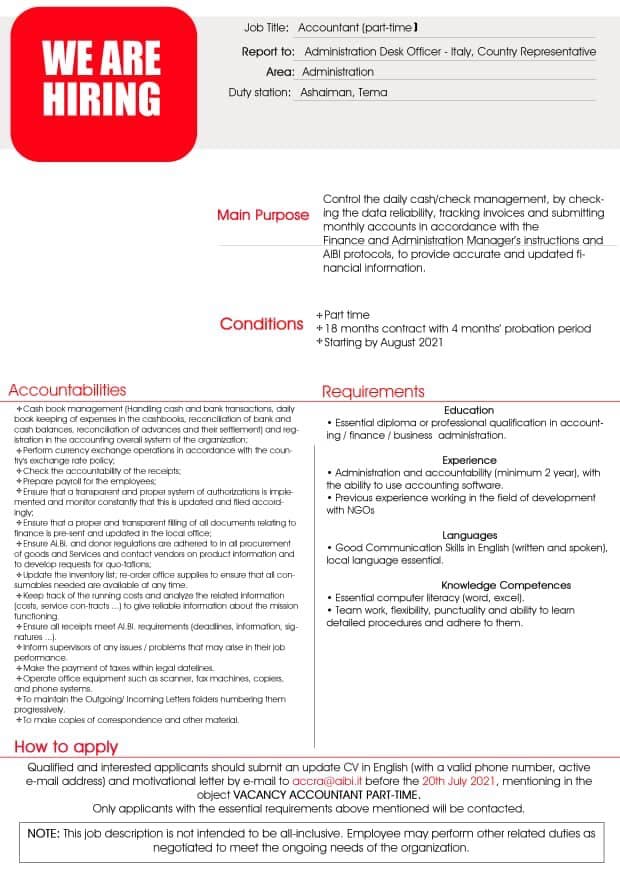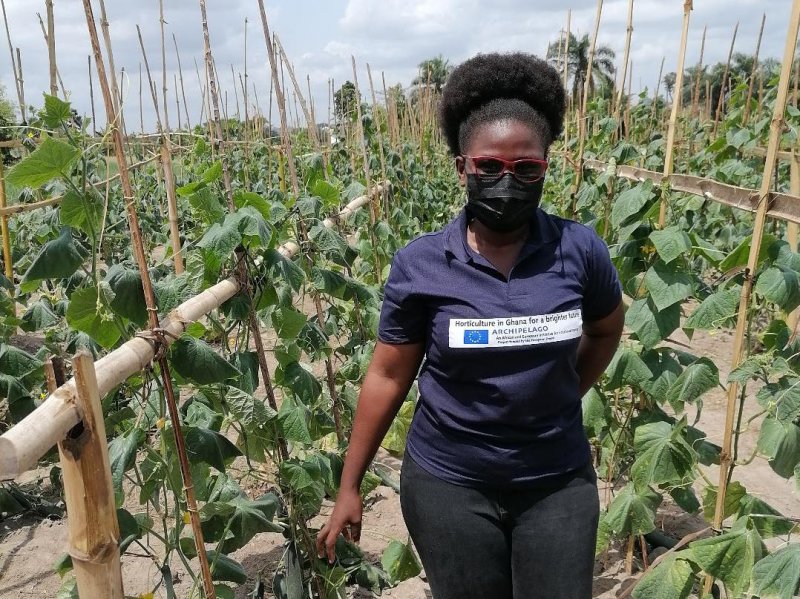At age 25, Adelaide Naa Okpoti, a Master’s Degree holder from the Kwame Nkrumah University of Science and Technology (KNUST) is already “deep” into farming and bent on making it big through horticulture farming.
The dexterous, daring and charming Adelaide, who has just completed a training in Horticulture and entrepreneurship at the Kwadaso Agriculture College, is beaming with a lot of hope that her love for vegetable production will yield much results.
That, she, together with her partner farmer, Abigail Essel, also a 25 year old, will brace the storms and become successful horticulture farmers in organic production.
She hopes to give the consuming public, the best farm produce from her farm, as well as feed the nation.
She has already named her farm, “Fresh field”.
Sadly, an enthusiastic Adelaide, whose love and interest for farming started at primary six in the course of her integrated Science lessons at school, said her original farmland located at Shai Hills in the Greater Accra Region is now in dispute.
That piece of land is unfortunately in litigation now with three other people claiming ownership.
The farm land was purchased in September 2020 by the parents of Abigail, her partner farmer.
The duo, are now talking to those they bought the land from and also looking for alternative land to start all over again.
The Ghana News Agency (GNA) chanced upon Adelaide at the Kwadaso Agriculture College (KAC) during a field visit by a team of implementers of the Archipelago project currently being implemented in Ghana with funding from the European Union Commission.
The team was made up of a delegation from the Delft University of Technology (TU Delft) in the Netherlands, the Kwadaso Agriculture Collage (KAC), the Holland Green Tech, and the Kumasi Business Incubator Hub at the Kwame Nkrumah University of Science and Technology (KNUST).
Dubbed the “Entrepreneurship in Horticulture: Farming as a Business” project, it was designed to offer 400 young Ghanaians, including Adelaide, with the knowledge and skill to do horticulture farming as a business.
On the same project, some other 40 model farmers are also being trained as lead farmers, to in turn train other farmers in sustainable horticulture.
Sharing her story with the GNA, the unperturbed Adelaide said in order to keep her dream alive, she has started making alternative arrangement for another piece of land at Akosombo, where she will be farming with two other male friends upon the completion of her course while she awaits decision on the three-acre Shai Hills farmland.
Adelaide studied General Arts at the secondary school level and then Economics at the University, and also a Master’s degree in Economics from KNUST.
Her partner, Gifty had also learnt tech farming.
Continuing her endearing story, Adelaide said she first entered farming so she could grow some few crops for herself and her family, but had learnt through her horticulture class, that farming goes beyond just that.
She said as she enrolled in the horticulture training at KAC, her vision as a subsistence vegetable farmer changed and now has come to appreciate the value of doing horticulture for business based on the tutorials they were given.
She said she and her partner farmer intended planting cucumbers and tomatoes as starters.
Unfortunately, while they were preparing to transplant their first nursed seedlings on their farm, their land become a subject of litigation, thus their nursed tomato and cucumber seedlings, could not be transplanted-all gone bad.
She explained that prior to her participating in the Horticulture programme, she used to be involved in selling of organic tomatoes, which they got from a tech shelter farm and used to deliver them to the homes of individual customers.
Therefore, there is an already market where they could easily sell their farm produce.
For the course she did at Kwadaso, the most intriguing part that also spurred the business aspect of farming was the entrepreneurship lessons that taught her the business side of farming.
However, the Integrated Pest Management (IPM) and that of irrigation, which she believes address the most important issues facing many farmers in Ghana, against the backdrop of climate change effect on farming, were her favourite topics.
She said the IPM lessons for instance, taught her to always think about the biological way of controlling pest-the organic and biological way to keep her produce free from chemicals.
“I noticed that those two courses best address the challenges of most farmers in Ghana because most of them relay on rainfall for their crops and for their yields. But with recent impact of climate change and the weather changes, we have been taught how to do precision farming and be able to reap the expected result,” she said.
GETTING ASSISTANCE
On how they got the financial capital to start the farming, Adelaide explained that before they started their farming project, they wrote a business plan, which was approved by another partner, a lawyer, who she described as a Co-founder who provided GHC20,000 out of the GH¢ 40,000 proposal grant money for the farming.
MARKETING HER PRODUCE
On how she plans on marketing her farm produce, Adelaide said she already has the market available, which she cultivated before enrolling onto the programme and so they will not be any major challenge in marketing her produce at all.

FUTURE PLANS
“In the future we plan to get more acres of land and do farming on a large scale.
“We will run a farm for education, for tourism and for training of other farmers,” Adelaide disclosed, adding that she intend teaching farmers’ data driven and precision farming that also involved soil analysis, knowing the weather condition, soil type, farm planning, crop type among others.
“I see myself bringing local farmers together and teaching them precision farming and to gain money from what they are doing”.
She would also run Green Houses to nurture seedlings for farmers and establish a mobile app where people could order their fresh vegetables for delivery.
“We also plan to move onto other vegetables based on the preferences of our customers,” she said.
Our goal is also to get more acres of land and expand our farming project, she said optimistically.
She said being the first born daughter, she is happy she was getting all the support from her parents and two other siblings.
She hopes to make a meaningful wage from farming and help take care of her four other orphaned cousins who have joined their family and being taken care of by her parents.
Before I started this programme I didn’t have this big dream but within this two months I have been able to think about this big thing and learnt to start from my small corner, Adelaide said elatedly.
ADVICE TO HER PEERS
She advised her fellow young ladies to hold on to good morals, find something good doing or seek to explore available opportunities like the Horticulture for Future programme that may come their way.
“People will not let you have it easy just because you are a lady,” she cautioned other young women.
CALL FOR ASSISTANCE
Adelaide appealed to government to assist in providing farm lands for the youth by demarcating arable lands for farming purposes as a boost to young farmers.
There should also be funding opportunities for programmes like the Horticulture for Future project to encourage more youth into agriculture.
She also called on other local Non-Governmental Organisations to support the sector.
She appealed that the Horticulture programme should be extended to other regions to allow other young people to explore such opportunities to better their life.
LESSONS
From Adelaide’s story, one can tell that her love for farming was nurtured right at the basic school where she was guided by her teachers to experiment the process of seed planting.
That simple practice, she said, was the “magic bullet” for her which also kept her love for farming through to the University level.
It is therefore important that our children are trained right from the beginning to see farming as essential vocation in order to get as many of the future generations to also take farming as a future career and contribute towards the food basket of the country and beyond.







